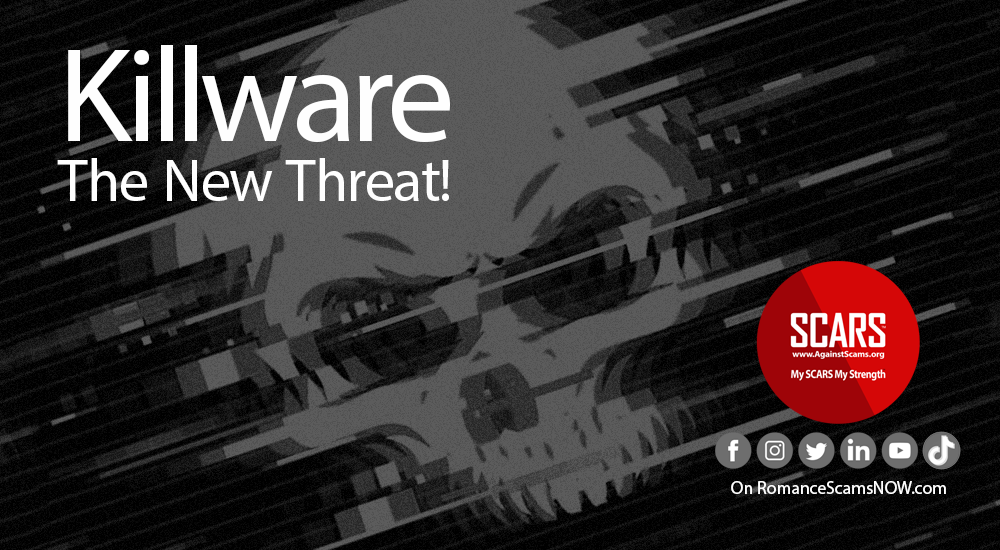
SCARS Institute’s Encyclopedia of Scams™ Published Continuously for 25 Years

Over The Last Two Years, We Have Seen Malware Used To Hurt Humans!
What is Killware?
Killware is a program or code that deploys on machines with the sole intention of harming people.
This harm does not correspond to financial or emotional harm, but instead, it has to do with physical harm.
As the name suggests, Killware is a type of malware that intends to take lives.
Unlike ransomware that gets into your system and locks it away from you until you give them money, killware is a virus run by psychopaths that have nothing to do with money. They just want to create destruction.
During an interview for USA Today, Alejandro Mayorkas, a U.S. Secretary of Homeland Security, said that ordinary consumers need to increase their cyber hygiene. He pointed out that work in many cases now is done from home, and the interconnectedness creates vulnerabilities that bad actors could exploit. While up until now, hackers have predominantly been focused on causing monetary damage, recent attacks on critical infrastructure confirm that more and more hackers are out there to simply cause harm. While financial troubles can be undone one way or another, the actions of cyber terrorists can be lethal and irreversible.
A good example is an incident that occurred in Florida earlier this year. The cybercriminals behind the attack used malicious code to tackle a water plant in Oldsmar, Florida. The sole purpose of the hacker who penetrated the system was to cause water contamination that could have harmed real people living in the sunshine state. Luckily, the attack was stopped before the water quality was affected. However, the attacker was never caught, and to this day, no one knows who was behind the attack. If the attack was successful – people could have gotten very hurt. What makes this particular attack scary is that the water facility was attacked purely to cause harm. There were no ransom requests.
Should you be Worried?
In general, killware will not impact consumer computers (we hope), such as the laptops and devices that regular people use on a day-to-day basis.
Instead, the main intention is to attack companies and agencies that control life depending activities.
For instance, city or state networks control the traffic signals. These cybercriminals or hackers can use their killware viruses to attack this system and cause disruption in the traffic lights. This will potentially lead to accidents and may also result in road fatalities and injuries. It can also block first responders with disastrous results to life and property.
Another example would be a killware attack on flight control systems. This can lead to incorrect instructions during a flight operation and lead to a deadly plane crash. Thus, these attacks on critical computer systems and servers can impact the lives of thousands of people, leaving them to face a traumatic incident.
Another target are hospitals, and with the thousands of network-connected devices doing everything from monitoring patients to administrating drugs, maintaining life on ventilators, and more! The potential for harm is astronomical.
You should not be worried about your personal asset or business – theoretically. Instead, organizations and government agencies should be the ones to consider the impact of such malware. Fortunately, large organizations spend countless of money on the protection of their systems and firewalls. However, as we have seen mistakes happen and if ransomware can shut down a hospital, killware could commit murder just as easily.
The Cost of Human Errors
With killware present as another type of malware threat in 2021, the costs of human errors are now much higher.
Most of the time, malware entering your system is due to human errors. Essential companies that are running critical servers now have to be extra careful with their passwords and human errors.
If you run a system that can potentially put the well-being of your workers at risk, then you should be more considerate about your passwords, security, and errors with the added threats of killware. You need to make sure to install updated firewalls to your IT infrastructure, along with antivirus and anti-malware software.
However …
Let’s not forget that our lives are protected by our devices 24/7 at home too!
Our IoT devices, from security cameras and alarms, to thermostats, to alternate power systems, all have the potential to cause physical harm or contribute to actions that can place you and your family at risk.
Imagine is home invaders use killware to invade a property with the intent to commit a crime? What if a hacker uses killware to take control of a car on the freeway? What if a pedophile takes control of alarms and baby monitors to kidnap a child? What if remote drone farm equipment could be used by a hacker to poison food? What if automated pharmacies could be controlled to fill prescriptions incorrectly? What if home patient monitoring systems could be controlled by killware to kill an elderly patient by not reporting emergencies? These are just a few examples.
What Should You Do?
If the killware news has made you more alarmed about the vulnerabilities of your computers, devices, or network, then you can strengthen them by first investing in the best in class anti-malware. An anti-malware investment is well worth your money, and it will help protect your digital assets and valuable data.
Have a malware protector running around the clock scanning for viruses, and alarming you overall potential threats. Furthermore, to avoid human errors, make sure that you do not use any common passwords that apply to all your accounts. Use separate passwords on every device and account. Use a password manager app to help you keep track of them, but also have a paper password log book!
Make sure to clear your browser cache automatically (see your browser settings) since most hackers tend to read your cache files before attacking a system. The best approach is to schedule your browser to clear the cache every time you shut down your laptop or device.
Lastly, make sure that you do not click on links that come with emails, texts, or messages without proper investigation. Make sure that you thoroughly inspect and investigate the sender’s profile and address before you decide to trust their source. Email inbox is the most common playground for hackers. Hence, be careful of all emails that fly into your inbox unexpectedly.
If you are concerned about the security of any device, simply unplug it and stop using it!
-/ 30 /-
What do you think about this?
Please share your thoughts in a comment below!
LEAVE A COMMENT?
Recent Comments
On Other Articles
- Arwyn Lautenschlager on Love Bombing And How Romance Scam Victims Are Forced To Feel: “I was love bombed to the point that I would do just about anything for the scammer(s). I was told…” Feb 11, 14:24
- on Dani Daniels (Kira Lee Orsag): Another Scammer’s Favorite: “You provide a valuable service! I wish more people knew about it!” Feb 10, 15:05
- on Danielle Delaunay/Danielle Genevieve – Stolen Identity/Stolen Photos – Impersonation Victim UPDATED 2024: “We highly recommend that you simply turn away form the scam and scammers, and focus on the development of a…” Feb 4, 19:47
- on The Art Of Deception: The Fundamental Principals Of Successful Deceptions – 2024: “I experienced many of the deceptive tactics that romance scammers use. I was told various stories of hardship and why…” Feb 4, 15:27
- on Danielle Delaunay/Danielle Genevieve – Stolen Identity/Stolen Photos – Impersonation Victim UPDATED 2024: “Yes, I’m in that exact situation also. “Danielle” has seriously scammed me for 3 years now. “She” (he) doesn’t know…” Feb 4, 14:58
- on An Essay on Justice and Money Recovery – 2026: “you are so right I accidentally clicked on online justice I signed an agreement for 12k upfront but cd only…” Feb 3, 08:16
- on The SCARS Institute Top 50 Celebrity Impersonation Scams – 2025: “Quora has had visits from scammers pretending to be Keanu Reeves and Paul McCartney in 2025 and 2026.” Jan 27, 17:45
- on Scam Victims Should Limit Their Exposure To Scam News & Scammer Photos: “I used to look at scammers photos all the time; however, I don’t feel the need to do it anymore.…” Jan 26, 23:19
- on After A Scam, No One Can Tell You How You Will React: “This article was very informative, my scams happened 5 years ago; however, l do remember several of those emotions and/or…” Jan 23, 17:17
- on Situational Awareness and How Trauma Makes Scam Victims Less Safe – 2024: “I need to be more observant and I am practicing situational awareness. I’m saving this article to remind me of…” Jan 21, 22:55
ARTICLE META
Important Information for New Scam Victims
- Please visit www.ScamVictimsSupport.org – a SCARS Website for New Scam Victims & Sextortion Victims
- Enroll in FREE SCARS Scam Survivor’s School now at www.SCARSeducation.org
- Please visit www.ScamPsychology.org – to more fully understand the psychological concepts involved in scams and scam victim recovery
If you are looking for local trauma counselors please visit counseling.AgainstScams.org or join SCARS for our counseling/therapy benefit: membership.AgainstScams.org
If you need to speak with someone now, you can dial 988 or find phone numbers for crisis hotlines all around the world here: www.opencounseling.com/suicide-hotlines
A Note About Labeling!
We often use the term ‘scam victim’ in our articles, but this is a convenience to help those searching for information in search engines like Google. It is just a convenience and has no deeper meaning. If you have come through such an experience, YOU are a Survivor! It was not your fault. You are not alone! Axios!
A Question of Trust
At the SCARS Institute, we invite you to do your own research on the topics we speak about and publish, Our team investigates the subject being discussed, especially when it comes to understanding the scam victims-survivors experience. You can do Google searches but in many cases, you will have to wade through scientific papers and studies. However, remember that biases and perspectives matter and influence the outcome. Regardless, we encourage you to explore these topics as thoroughly as you can for your own awareness.
Statement About Victim Blaming
SCARS Institute articles examine different aspects of the scam victim experience, as well as those who may have been secondary victims. This work focuses on understanding victimization through the science of victimology, including common psychological and behavioral responses. The purpose is to help victims and survivors understand why these crimes occurred, reduce shame and self-blame, strengthen recovery programs and victim opportunities, and lower the risk of future victimization.
At times, these discussions may sound uncomfortable, overwhelming, or may be mistaken for blame. They are not. Scam victims are never blamed. Our goal is to explain the mechanisms of deception and the human responses that scammers exploit, and the processes that occur after the scam ends, so victims can better understand what happened to them and why it felt convincing at the time, and what the path looks like going forward.
Articles that address the psychology, neurology, physiology, and other characteristics of scams and the victim experience recognize that all people share cognitive and emotional traits that can be manipulated under the right conditions. These characteristics are not flaws. They are normal human functions that criminals deliberately exploit. Victims typically have little awareness of these mechanisms while a scam is unfolding and a very limited ability to control them. Awareness often comes only after the harm has occurred.
By explaining these processes, these articles help victims make sense of their experiences, understand common post-scam reactions, and identify ways to protect themselves moving forward. This knowledge supports recovery by replacing confusion and self-blame with clarity, context, and self-compassion.
Additional educational material on these topics is available at ScamPsychology.org – ScamsNOW.com and other SCARS Institute websites.
Psychology Disclaimer:
All articles about psychology and the human brain on this website are for information & education only
The information provided in this article is intended for educational and self-help purposes only and should not be construed as a substitute for professional therapy or counseling.
While any self-help techniques outlined herein may be beneficial for scam victims seeking to recover from their experience and move towards recovery, it is important to consult with a qualified mental health professional before initiating any course of action. Each individual’s experience and needs are unique, and what works for one person may not be suitable for another.
Additionally, any approach may not be appropriate for individuals with certain pre-existing mental health conditions or trauma histories. It is advisable to seek guidance from a licensed therapist or counselor who can provide personalized support, guidance, and treatment tailored to your specific needs.
If you are experiencing significant distress or emotional difficulties related to a scam or other traumatic event, please consult your doctor or mental health provider for appropriate care and support.
Also read our SCARS Institute Statement about Professional Care for Scam Victims – click here to go to our ScamsNOW.com website.
















Thank you for your comment. You may receive an email to follow up. We never share your data with marketers.